Guava is an important member of the family Myrtaceae. This fruit-bearing tree is not just a delightful addition to any landscape; it also provides us with many health benefits. Guava trees are a prized addition to any garden or orchard with their luscious fruits and vibrant foliage. Fertilizers provide some essential nutrients that are necessary for healthy plant development. Fertilizers promote strong root systems in Guava trees.
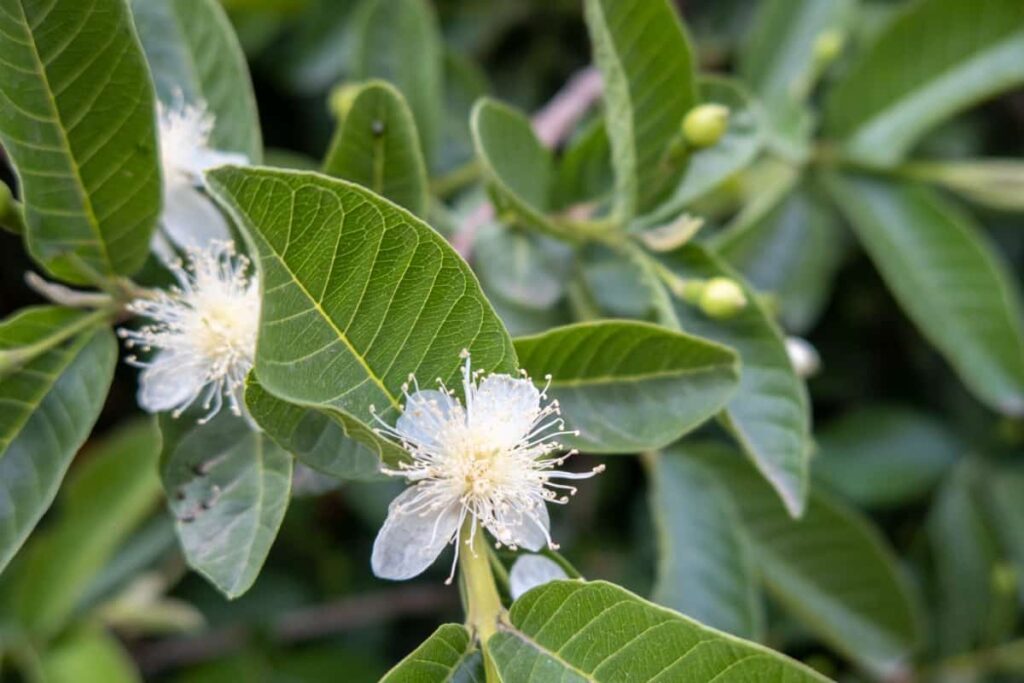
A well-developed root system allows plants to access water and nutrients effectively from the soil. This improves overall plant health and enables them to withstand environmental stresses. One of the primary macronutrients Guava trees require is nitrogen (N). Nitrogen promotes leaf growth and vibrant green foliage. Phosphorus (P) aids in root development and flower formation.
Potassium (K), on the other hand, helps with overall plant vigor and enhances fruit quality. In addition to these macronutrients, Guava trees also benefit from several micronutrients like iron (Fe), manganese (Mn), zinc (Zn), boron (B), molybdenum (Mo), etc., which are essential for enzyme activation and proper metabolic functions within the tree.
Applying fertilizer to Guava trees at the right time and in the right amounts can promote healthy growth and maximize fruit production. The timing of fertilizer application in Guava trees will depend on your tree’s specific needs and growth stage. Generally speaking, applying fertilizer during the spring or early summer when new growth begins is best.
Best Fertilizer for Guava Trees
Organic Fertilizers for Guava Trees: Enhancing Growth and Fruit Production Naturally
One of the best organic fertilizers for Guava trees is compost. It enriches the soil by adding essential nutrients and improving its structure. It also increases soil microbial activity, promoting nutrient uptake by the tree roots. Due to their numerous benefits for plant health, seaweed-based fertilizers are gaining popularity among gardeners. Seaweed extracts contain valuable trace elements, vitamins, amino acids, and plant hormones that stimulate root development and increase disease resistance.
Fish emulsion is another effective organic fertilizer for Guava trees. Rich in nitrogen, phosphorus, and potassium (NPK), it promotes vigorous growth and provides beneficial microorganisms that enhance soil fertility. It’s made from fermented fish remains and contains high nitrogen levels that promote healthy plant growth. Additionally, seaweed extract can be used as an organic fertilizer due to its abundant trace minerals that support overall plant health.
Natural Fertilizers for Guava Trees: Promoting Healthy Soil and Nutrient Uptake
One effective natural fertilizer for Guava trees is bone meal. This organic product is made from ground-up animal bones and contains high levels of phosphorus, which promotes flower formation and fruit production in Guava trees. Bone meal also helps improve soil fertility over time. Cover crops are another effective natural fertilizer option for Guava trees. Examples of suitable cover crops include legumes like clover or vetch.
Seaweed extract is another excellent choice for the natural fertilization of Guava trees. Rich in trace minerals and growth-promoting hormones, seaweed extract enhances root growth, increases resistance to disease and pests, and improves overall plant health. Worm castings are also used as a natural fertilizer for Guava trees. Worm castings are rich in beneficial microorganisms that help break down nutrients into forms readily available to plants. They also enhance the soil’s ability to retain moisture while improving its structure.
Homemade Fertilizers for Guava Trees: Cost-effective and Environmentally Friendly Options
One popular option is compost tea. It’s a simple yet effective fertilizer made by steeping compost in water. This allows beneficial microorganisms and nutrients from the compost to be extracted into the water, creating a nutrient-rich liquid fertilizer that can be easily applied to your Guava trees. Another great homemade fertilizer for Guava trees is banana peel tea. Banana peels are rich in potassium, essential for fruit production.
In case you missed it: High Yield Hybrid Guava Varieties in India: State Wise Cultivars
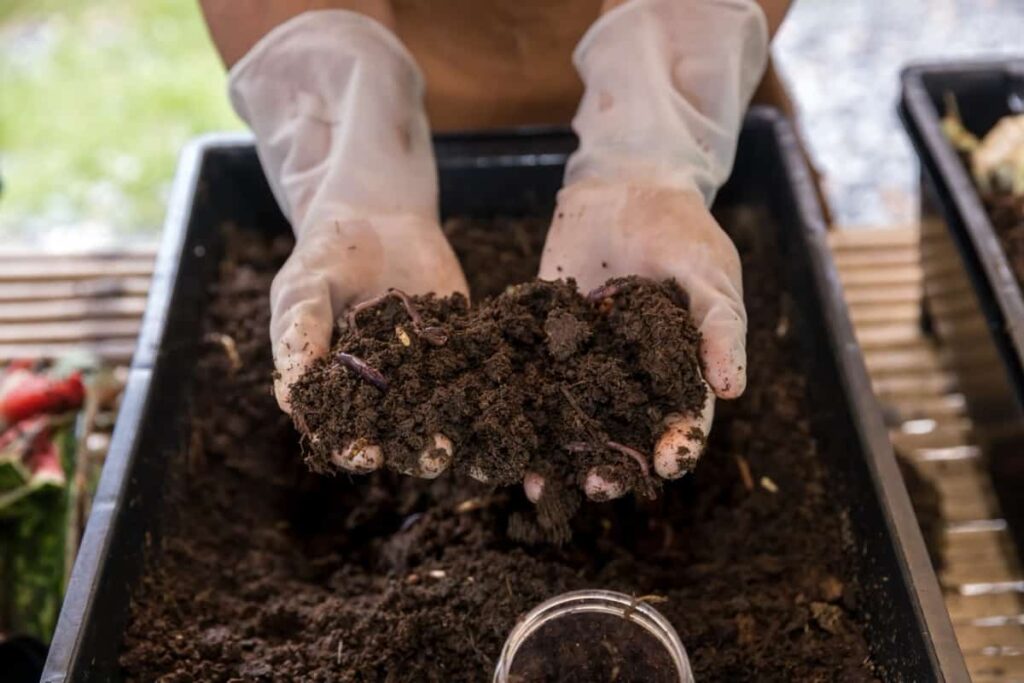
Soak chopped banana peels in water for a few days, strain out the solids, and use the resulting liquid as a natural fertilizer for your Guava trees. Eggshell powder is another fantastic option. Eggshells are packed with calcium, which helps strengthen plant cell walls and prevent diseases like blossom end rot. Crushed eggshells can be mixed into soil or added directly around the base of Guava trees. Coffee grounds make a good homemade fertilizer for Guava trees. They contain nitrogen and other important minerals that promote healthy foliage growth.
Sprinkle used coffee grounds around the tree base or mix them with soil before planting. Wood ash is another homemade fertilizer for Guava trees. Wood ash is rich in potassium, crucial for fruit development and overall plant health. Potassium helps regulate water uptake, improve disease resistance, and enhance the flavor of fruits. Additionally, wood ash contains small amounts of phosphorus and calcium, both important elements for root development and nutrient absorption. To use wood ash as a fertilizer, sprinkle a thin layer around the tree base.
Kelp meal, derived from dried seaweed, is a fantastic homemade fertilizer for Guava trees. It has some essential nutrients and minerals that promote healthy growth and development. To use kelp meal as a fertilizer for Guava trees, sprinkle a thin layer around the tree’s base or mix it into the soil during planting. The nutrients will gradually be released over time as the organic matter breaks down. Furthermore, kelp meal can enhance soil structure by improving water retention capabilities and providing beneficial microbes to support healthy soil ecosystems.
The Role of NPK Ratio in Guava Tree Fertilization: Finding the Right Balance
Guava trees, like any other plants, require the right balance of nutrients to thrive and produce abundant fruits. One crucial aspect of Guava tree fertilization is understanding the role of the NPK ratio. The NPK refers to the proportions of nitrogen (N), phosphorus (P), and potassium (K) in a fertilizer. Finding the right balance in the NPK ratio for Guava trees ensures optimal growth and fruit production.
In case you missed it: Low-maintenance Outdoor Potted Plants: For Winter, Full Sun, Shade, and All-year
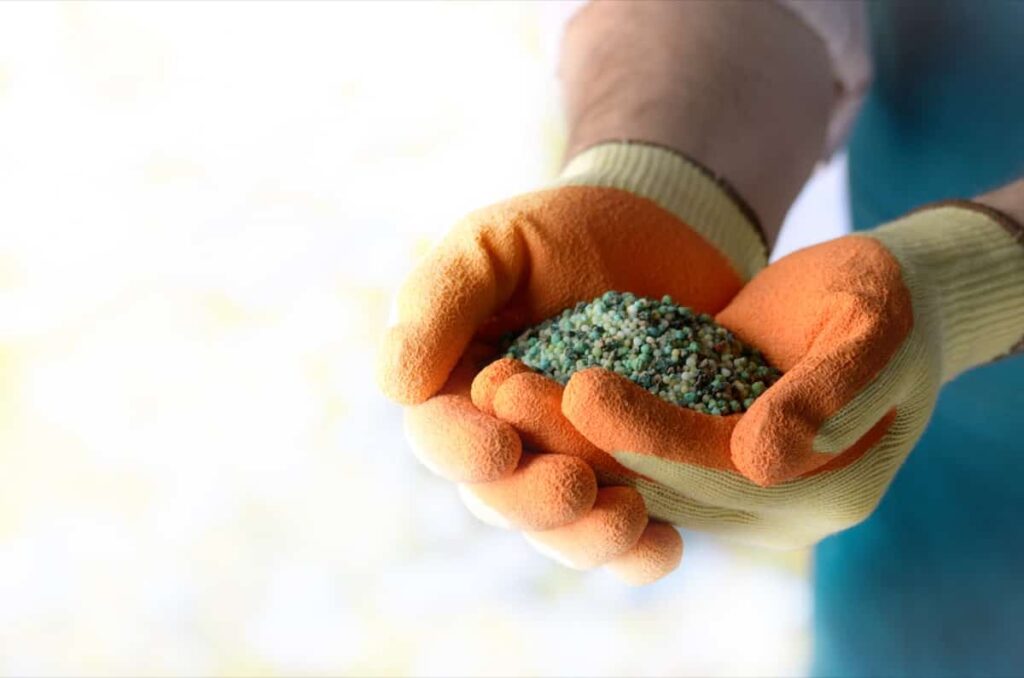
A recommended ratio for Guava tree fertilizers is 6-6-6-2, which signifies equal amounts of nitrogen, phosphorus, and potassium with an additional dose of magnesium. Moreover, fertilizer application enhances flowering in Guava trees. Regular feeding stimulates abundant flower formation, ultimately leading to a bountiful harvest of delicious Guavas. Using fertilizers promotes overall plant vigor in Guava trees.
Providing adequate nutrition for above-ground parts and roots makes these trees more resilient against pests and diseases while maintaining an attractive appearance throughout the year. Guava tree owners can enhance their plants’ resistance to diseases and pests by providing adequate nutrition through fertilizer application. Properly nourished trees are better equipped to withstand environmental stresses like drought or extreme temperatures. Nitrogen helps stimulate leafy growth, while phosphorus promotes root development and flowering.
Potassium aids in overall plant health, enhancing disease resistance and fruit quality. Magnesium plays a vital role in chlorophyll formation and photosynthesis. The ideal NPK ratio for Guava trees varies depending on their growth stage. More nitrogen should be applied during vegetative to promote vigorous shoot development. As your tree transitions into flowering and fruiting stages, more emphasis should be placed on phosphorus and potassium to support optimal yield production.
NPK Ratio for Guava Trees in Different Growing Stages
| Age of plants(Years) | FYM (Kg)/plant | N (Gm) | P (Gm) | K (Gm) |
| 1 | 5 to 8 | 100 | 50 | 50 |
| 2 | 10 | 200 | 100 | 100 |
| 3 | 15 to 25 | 300 | 150 | 150 |
| 4 | 25 to 30 | 400 | 200 | 200 |
| 5 | 40 to 50 | 500 to 650 | 250 to 325 | 250 to 375 |
For the first four years, FYM is applied in June. Inorganic fertilizers are given in three split doses distributed equally in July, September, and February.
Fertilizer Application Methods for Guava Trees
One common method is broadcasting, where you evenly spread the fertilizer around the tree’s base. This mainly allows the nutrients to slowly seep into the soil and reach the roots over time. Another popular method is trenching, which involves digging small trenches around the perimeter of your Guava tree’s drip line. You then apply the fertilizer directly into these trenches before covering them with soil.
In case you missed it: Best Outdoor Plants for Home Garden: Low-maintenance, Full Sun, Wunter, and All-year
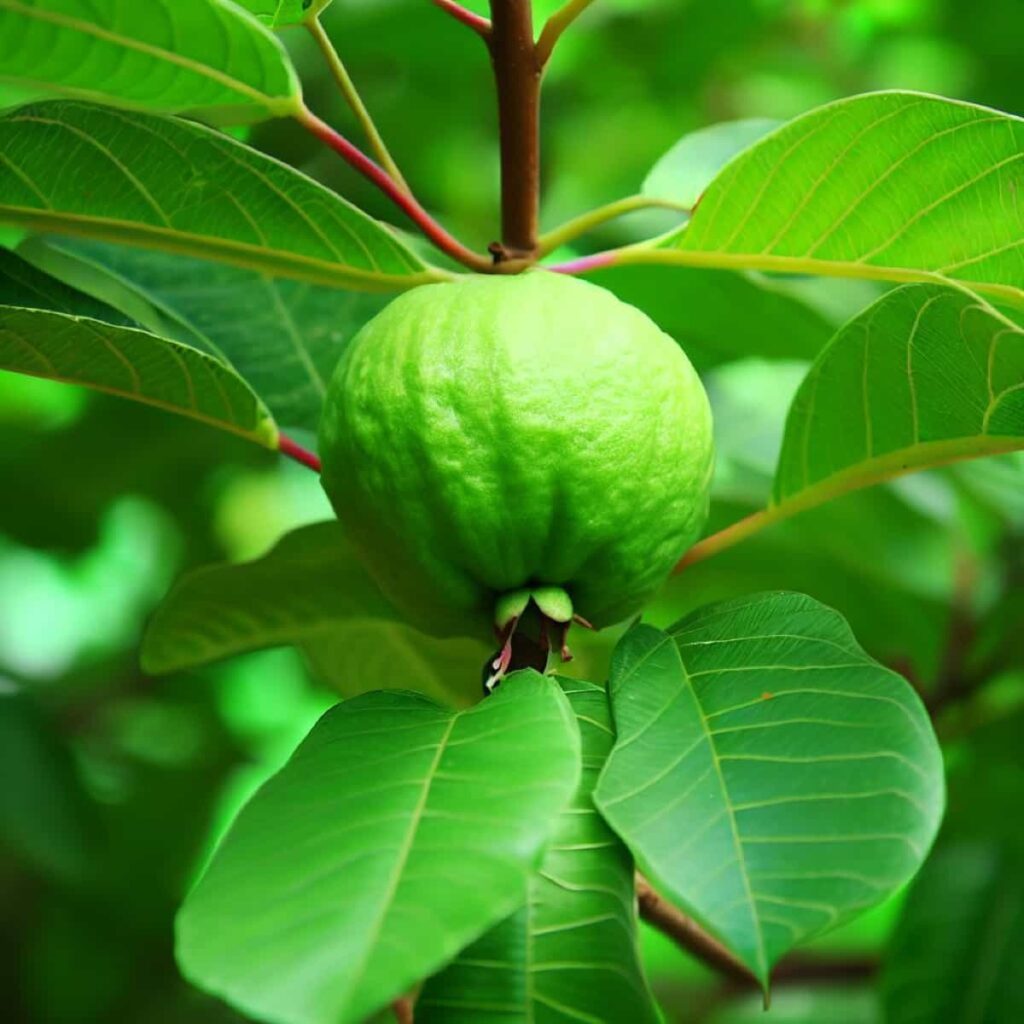
This method helps concentrate the nutrients near the root zone for maximum absorption. For those looking for a more targeted approach, foliar spraying might be worth considering. With this method, you dilute your chosen fertilizer in water and spray it directly onto your Guava tree’s leaves using a sprayer or mister.
The leaves absorb the nutrients through their stomata, allowing for quick uptake by the plant. Using granular or pelletized fertilizers could be ideal if you prefer a slow-release option requiring less frequent applications. These can be placed on or slightly beneath the soil surface near your Guava tree’s root zone and gradually release nutrients over an extended period.
The Benefits of Using Organic Fertilizers on Guava Trees: Environmental and Health Considerations
Organic fertilizers are natural sources such as compost, manure, and plant matter. They contain many beneficial microorganisms that improve soil structure and fertility. These microorganisms break down nutrients and organic matter that are easily absorbed by the roots of Guava trees. Using organic fertilizers minimizes the risk of chemical runoff into waterways, reducing pollution in our ecosystems.
Unlike synthetic fertilizers, which can leach harmful chemicals into the soil and contaminate groundwater, organic options promote sustainable farming practices. Furthermore, using organic fertilizers on your Guava trees eliminates exposure to potentially harmful chemicals in synthetic alternatives.
By choosing natural options, you protect yourself and those around you from unnecessary contact with toxic substances. Also, being environmentally friendly and safe for human health, organic fertilizers improve overall soil quality. They enhance nutrient availability while promoting beneficial microbial activity in the soil ecosystem.
Effective Fertilizer Schedule for Guava Trees in Different Climates and Soil Conditions
Guava trees have specific nutrient requirements, including nitrogen (N), phosphorus (P), potassium (K), and micronutrients like magnesium (Mg). Fertilizers help replenish these vital elements in the soil, ensuring optimal growth and fruit production. Furthermore, fertilizing Guava trees helps improve fruit quality. Balanced nutrient levels contribute to larger fruits with better taste and texture. Additionally, proper nutrition reduces common issues like premature fruit drop or diseases caused by nutrient deficiencies.
Fertilizing Guava trees is crucial because it gives them the necessary nutrients to thrive. These nutrients include nitrogen, phosphorus, potassium, and other essential minerals like magnesium and calcium. Guava trees may suffer from stunted growth, poor fruit development, and increased susceptibility to diseases without an adequate supply of these nutrients. Different regions have varying climates, including temperature, rainfall patterns, and seasons. Similarly, soil types can range from sandy to loamy or clayey.
In case you missed it: Fertilizer Schedule Chart for Indoor Plants: Season-wise Homemade, Organic, Natural, and Liquid Fertilizer Calendar
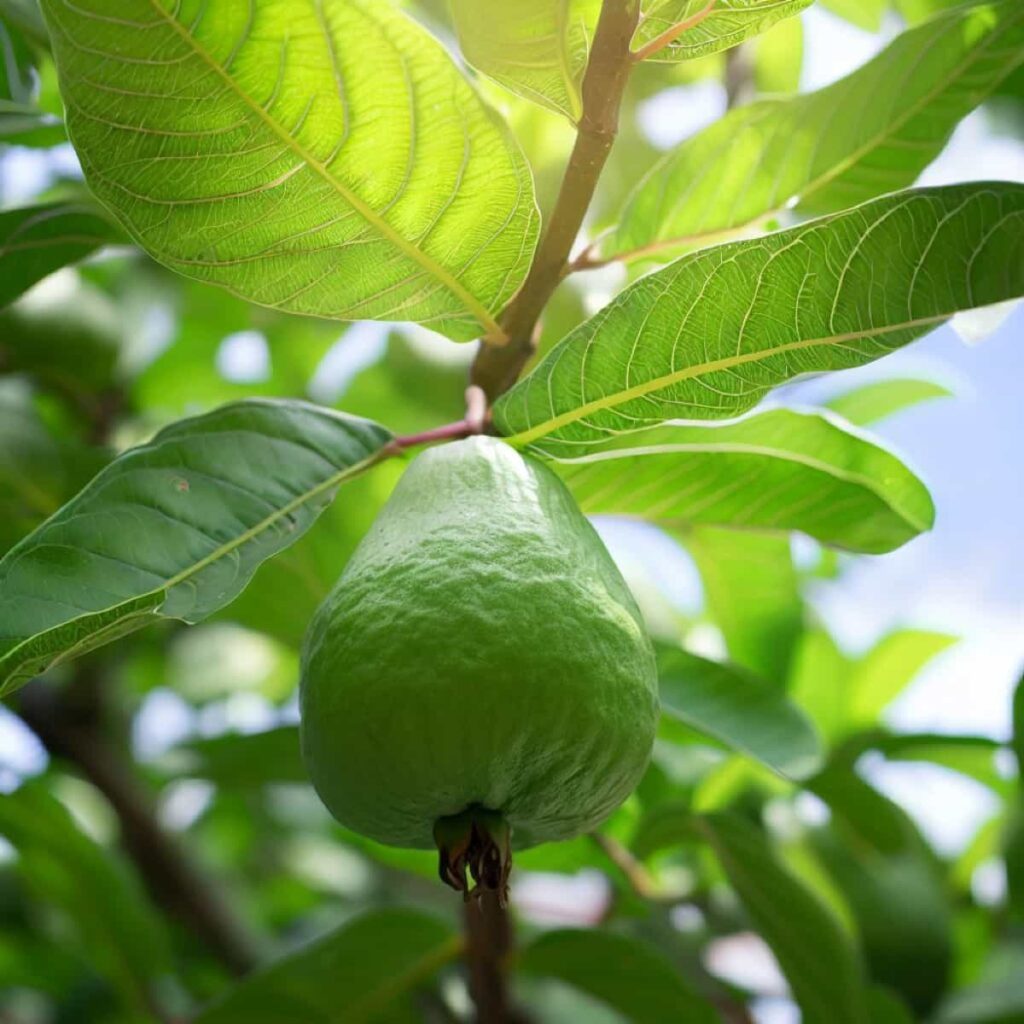
In tropical or subtropical climate regions, where Guava thrives best, it is recommended to apply fertilizer during the rainy season. This ensures that the nutrients are readily available for uptake by the roots. Dividing fertilizer applications into two doses can benefit areas with a dry season followed by heavy rains. For Guava trees growing in sandy soils that drain quickly and lack organic matter, frequent but light applications of organic fertilizers are recommended throughout the year.
Sandy soils tend to lose nutrients faster due to leaching. On the other hand, if your Guava tree is planted in loamy or clayey soil that retains moisture well but may become compacted over time, applying compost-based fertilizers during spring and fall will help improve soil structure while providing essential nutrients.
Sustainable Fertilization Practices for Guava Trees: Balancing Productivity and Environmental Impact
One of the key aspects of sustainable fertilization is using organic or natural fertilizers. These options enhance growth and fruit production and promote healthy soil and nutrient uptake. Organic fertilizers are natural sources like compost, manure, or plant-based materials. They release nutrients slowly, providing a steady supply without causing excessive runoff or pollution. You can tailor your fertilizer regimen by knowing the key elements and micronutrients needed for optimal growth.
This targeted approach minimizes wastage while ensuring your trees receive precisely what they need. An effective fertilizer schedule is also vital in maintaining sustainability. Depending on your region and crop variety, timing may vary. For example, in north India, applying fertilizer in the first week of May for rainy season crops and in the first week of July for winter season crops has shown positive results. Manuring twice a year during June-July and October also provides consistent nourishment throughout different seasons.
Best Fertilizer for Guava Trees (Schedule)
| Type of Fertilizer | Fertilizer Options | Best Time to Apply |
| Organic fertilizers | Compost, Seaweed-based fertilizers, Fish emulsion | During the growing season in early spring through late summer |
| Natural fertilizers | Bone meal, Cover crops, Seaweed extract, Worm castings | Early spring |
| Homemade fertilizers | Compost tea, Banana peel tea, Eggshell powder, Coffee grounds, Wood ash, Kelp meal | During the early spring or late winter months |
| NPK fertilizers | N (nitrogen), P (phosphorus), and K (potassium) | During periods of rapid growth, such as springtime |
In case you missed it: Best Fertilizer for Moringa: Organic, Natural, Homemade, NPK and Schedule for Moringa Tree
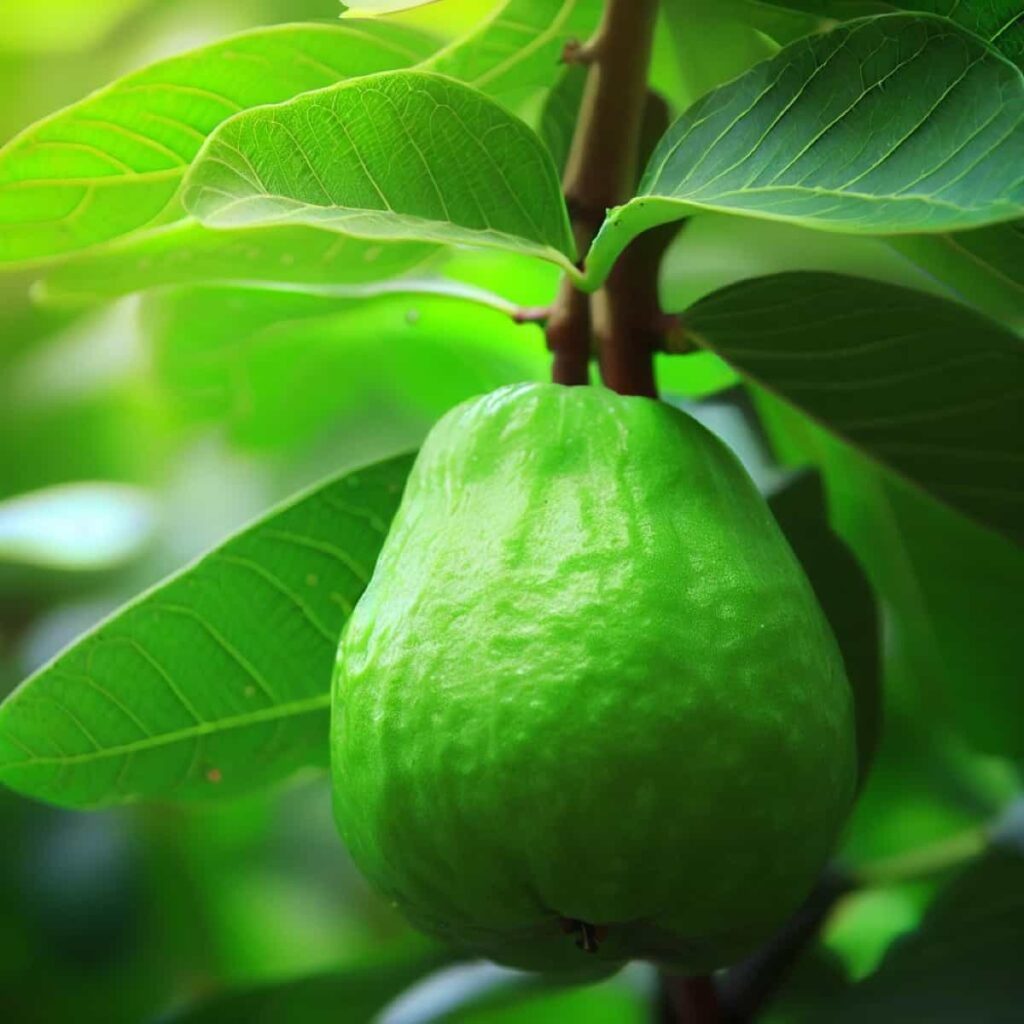
Conclusion
Fertilizer plays an important role in the Guava tree growth. These trees require a well-balanced nutrient supply to thrive and produce healthy fruits. Guava trees may suffer nutrient deficiencies without proper fertilization, leading to stunted growth and low fruit yield. Furthermore, fertilizers help improve soil fertility by replenishing nutrient levels that may have been depleted over time. This ensures that the soil remains rich in essential elements needed by Guava trees.
- Management Pests and Diseases in Your Cotton Field
- Sheep Farming Business Plan for Beginners
- Aquaponic Farming at Home: A Step-By-Step Guide
- Profitable Village Farming Business Ideas in 2024
- High-Yield Aquaculture: Fast-Growing Fish for Farming
- Effective Fish Pond Construction Techniques for Beginners
- Irrigation and Water Management in Pineapple Farming
- Blossom to Harvest: Mastering Flowering and Pollination in Papaya Farming
- Pig Fattening Essentials: From Selection to Sale for Beginners
- Raising Wagyu Cattle: A Complete Guide for Premium Beef Production
- Soil Types and Their Water Holding Capacity
- Optimizing Irrigation Schedules for Coconut Groves for Enhanced Yield
- Espresso Your Garden: Coffee Grounds for Healthier Acid-Loving Plants
- The Best Soil Mix for Snake Plants: How to Mix Your Own Snake Plant Soil
- Green Thumb Success: Expert Tips for Cultivating Greenhouse Beans All Year Round
- Bloom All Year Round: The Ultimate Guide to Indoor Hyacinth Care
- Eco-Friendly Gardening: How to Make Liquid Fertilizer from Kitchen Waste
- Ultimate Guide to Grow Anise in Pots: Explore Seed Propagation to Harvesting
- Guide to Raising Chester White Pigs: Discover Breed Facts to Growth Management
- Mastering the Elegance: The Ultimate Guide to Weeping Cherry Tree Care, Planting, and Maintenance
- Ultimate Guide to Planting Garlic in Grow Bags: Growing Strategies for Beginners
- How to Fix Spider Plant Leaf-Related Problems: Natural and Organic Remedies
- 10 Reasons Why Your Tulsi Plant is Shedding Leaves: Home Remedies and Solutions
- Optimizing Growth and Yield: The Advantages of Palm Bunch Ash Fertilizer
- Utilizing Neem Oil Extract as a Natural Pesticide for Hydrangea
- From Soil to Harvest: Various Ways in Which Farmers Can Use AI Tools
- Steps to Encourage and Induce Citrus Flowers: A Comprehensive Guide
- How to Fix Snake Plant Leaf-Related Issues: Natural and Organic Remedies
- Transform Your Garden into a Fragrant Oasis with Raat Ki Rani (Night Blooming Jasmine)
- Discover the Ideal Chicken Breeds for Philippine Farms
- How to Create a Poultry Egg Farm Business Plan for Profits
- Grow Lemon Cucumbers Like a Pro: Insider Techniques for Bountiful Yields
- Ultimate Guide to Caring for Your Pink Princess Philodendron: Tips for Thriving Variegation
- Areca Nut Profit Per Acre: Calculating Yield and Cost of Cultivation
- How Kaveri Chicken is Becoming a More Profitable Breed in Indian Backyards
- Transform Your Barn: 9 Steps to Convert a Horse Stall into a Chicken Coop
